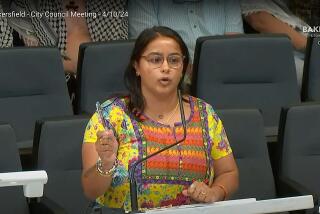School debate winner faces a three-peat challenge
When it opened four years ago, Santee Education Complex became known more for its violent beginnings than for its students’ forensic skill. In its first week, shots were fired in front of the campus. One day later, a student was arrested outside school with an AK-47.
Yet students from the troubled campus, operated by Mayor Antonio Villaraigosa’s Partnership for Los Angeles Schools, now have a reputation to uphold: Santee has been among the winners of the United Nations Foundation Global Debates contest two years running, earning a three-day trip each year to the U.N. in New York City.
Past participating California high schools have included such high-fliers as Palo Alto (which has an 899 on the state Academic Performance Index, based on test scores and rated on a scale of up to 1,000 points) and Saratoga (with 933). Santee hovers at 522.
“Santee has been one of the most dedicated high schools,” said Kaitlin Barry, foundation director of campus outreach. “At first this surprised me, but it no longer does.”
When the foundation kicked off the contest in 2007 with help from the National Forensic League and the International Debate Education Assn., 475 schools around the world signed up. In the 2008-09 school year, 965 registered. To win, schools had to hold a debate. But they also had to accumulate points by, among other things, creating photo essays, filming public service announcements and writing letters. Sixteen winners were selected each year.
Santee’s underdogs gained the edge by earning as many points as they could. They racked up 23,850 last year.
But most of the school’s successful debaters have either graduated or left the team.
“For a couple of them, the only thing they had to say about themselves was that they did debate,” said English teacher Nick Richert, who coaches the team. “It really seemed like the bright spot in their lives.”
Now, the problem is attracting and retaining students.
Richert recruited from his classes and others, but students kept dropping out.
The coach “wore me down,” said Eric Ochoa, who has a peacock tattooed on his left arm and a keen interest in aviation during World War I. “Otherwise I wouldn’t be here.”
Richert took what he could get. He had been begging students to join for days. The debate, on whether the U.N. should prioritize poverty over climate change, was held Oct. 30, pitting one pair of Santee students against another. Contest rules require proof, usually in video format, that the debate occurred, but the event is not judged for quality.
Now that the debate is over, the team has other concerns. The U.N. Foundation changed the guidelines this year. Gone are some of the extra ways schools could earn points. Concerns over the quality of submissions apparently led to that decision, Richert said.
More than 2,000 schools have already registered -- double the turnout from last year -- and the foundation has slashed the number of winning slots to five from the U.S. and five from abroad. Of those, only two U.S. and two international teams will earn an all-expense-paid trip to the Netherlands.
All this means Santee will have to rethink its strategy.
Miguel Ascencio, the team’s only veteran debater, wants to win again. He recalled the grandeur of Times Square and the height of the Empire State building. “It was cool to meet the teams from Moldova and Korea,” he said.
Though they were crunched for time, this year’s debate was a cut above the last. Miguel and Eric were “actually sitting down the week before and researching and writing,” Miguel said. Last year, “my opponent said I turned it into a Jerry Springer episode.”
Miguel had left practice accompanied by two police officers the night before the debate, and his teammates were worried. It turns out he was supposed to have walked home after school but stayed late to finish his rebuttal statement. His mother, who had heard nothing from him, had feared the worst and called police. She showed up at school in tears, with the officers.
But Miguel made it to school the next day, and the debate went on.
Santee students make for a tough audience. When Los Angeles City College debate coach Ken Sherwood warned that students who didn’t set goals would “get to work at McDonald’s for the rest of your life,” the crowd hooted, mocking him.
Eric fired his opening shot. He spoke clearly, unfazed by the rowdy audience. “Snap your fingers. . . . Someone in the world just died due to preventable disease,” he said, prompting a volley of snaps from students.
The audience cheered during the crossfire section. “Why are you willing to let people die to fix climate change?” Eric fired at his opponents.
Half an hour later, it was over. The audience had voted. The six teammates counted the ballots, elated, pretending to throw the paper slips like confetti. “It’s over,” Miguel said, relief evident.
Richert let him have his moment. The debate was essentially the qualifying round of the competition. The Santee students had yet to start earning points on the activities.
Senior Luiza Pineda had already come up with a service project: a garden to help feed the hungry, neatly tying poverty to the environment.
Richert took the idea to next level: Put a garden box on a bike and take it to schools.
He looked at the students. “So,” he asked expectantly, “see you guys next week?”
More to Read
Start your day right
Sign up for Essential California for news, features and recommendations from the L.A. Times and beyond in your inbox six days a week.
You may occasionally receive promotional content from the Los Angeles Times.







